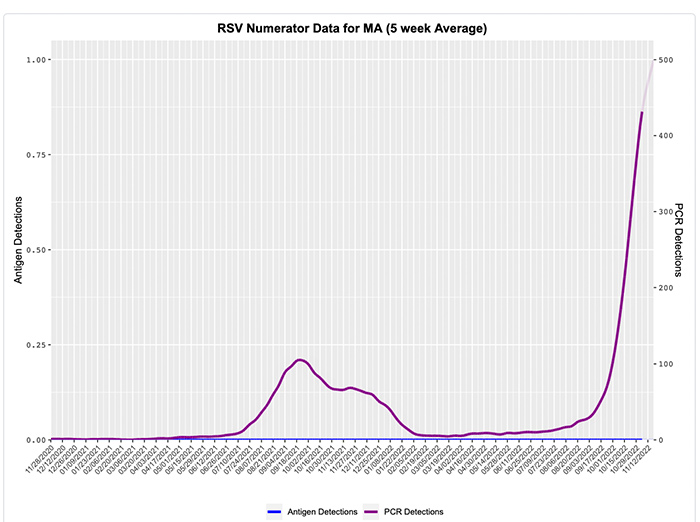Berkshire Health Systems and Community Health Programs strongly urge parents to take preventive measures to protect their children against seasonal respiratory illnesses, particularly the surging respiratory syncytial virus (RSV).
With flu season emerging and Covid-19 persisting, the risk of triple-virus exposure – especially for very young children – is straining hospitals and pediatric healthcare providers across the U.S., Massachusetts, and the Berkshires.
In Massachusetts, the five-week average of RSV cases detected by PCR test was 4.4 on March 19, 2022. By Nov. 12, however, that figure had jumped to 296.3, according to data reported by the U.S. Centers for Disease Control.
For most people, including children, RSV behaves like a cold and lasts about two weeks. But some children are at higher risk and require hospitalization.
Unlike flu and Covid-19, there is no vaccine for RSV, a longstanding common seasonal illness. However, RSV is the leading cause of bronchiolitis and pneumonia in infants and very young children. Young children with underlying health conditions are especially vulnerable.
“The first years of the Covid-19 pandemic caused parents to protect their children against exposure to illness, which means very young children haven’t had the chance to build natural RSV immunity,” said Dr. Laura Need, CHP associate medical director and a pediatrician at CHP Berkshire Pediatrics. “As a result, some children are becoming sicker and require hospital care.”
In November, three statewide medical associations urged the public to take preventive measures following a worrisome spike in RSV diagnoses and hospitalizations.
“Mirroring hospitals across the Commonwealth and the nation, Berkshire Health Systems is experiencing significant challenges with providing care for a population impacted by three viruses circulating at once,” said James Lederer, MD, BHS chief medical officer/chief quality officer. “We have consistently had between 8 and 12 Covid-19 in-patients for the past several months with a community transmission rate that remains higher than we’d like. RSV is a serious concern in our pediatric population, with influenza also heading into peak season in coming weeks and months.”
Parents and caregivers are advised to take the following measures to keep their children safe from RSV and other viruses:
- Keep sick children at home and keep them home until 24 hours after symptoms are gone.
- Wash hands and surfaces frequently.
- If possible, avoid bringing children to crowded indoor settings.
- If children attend indoor settings, those who are able should wear a mask, even if they are well.
- Call the pediatric office if a child develops a high fever or has trouble breathing.
Across the state, hospitals are reporting that their pediatric in-patient hospital capacity is stretched for children whose illness becomes serious enough to require inpatient care.
CHP Berkshire Pediatrics has been working to keep up with an increase in calls about RSV. At Berkshire Health Systems, the inpatient Pediatric Unit at Berkshire Medical Center and the Emergency Departments at BMC and Fairview Hospital are seeing numerous cases of RSV.
“It’s important not to focus too much on one particular illness since viruses are happening simultaneously and overlapping,” said Need. “Most importantly, parents should have children six months and older vaccinated against flu and Covid-19 to keep those illnesses at bay or to lessen the effects of those viruses.”

